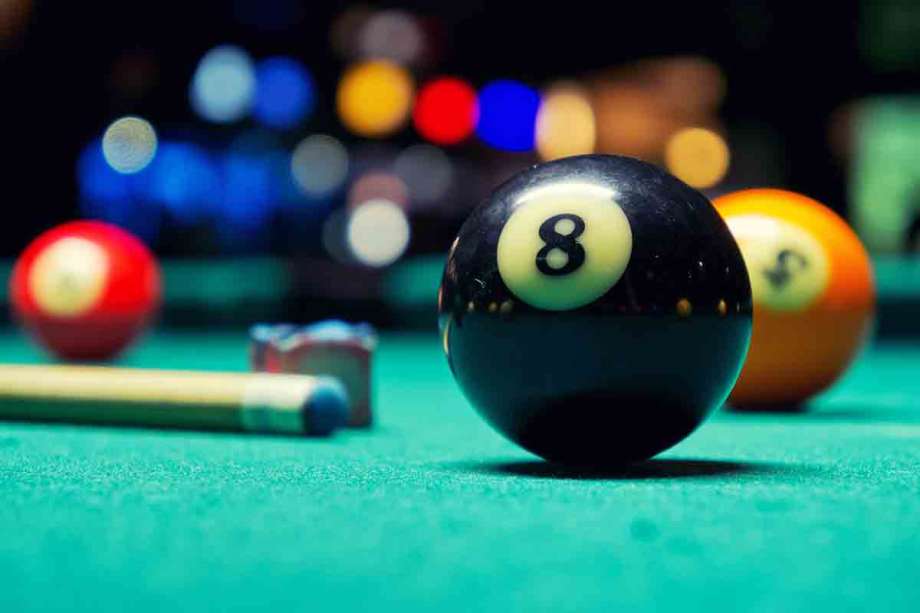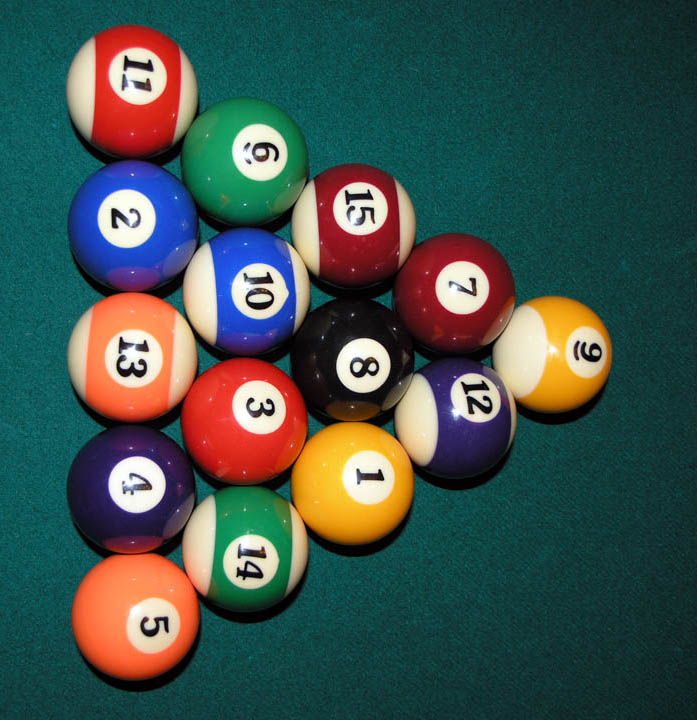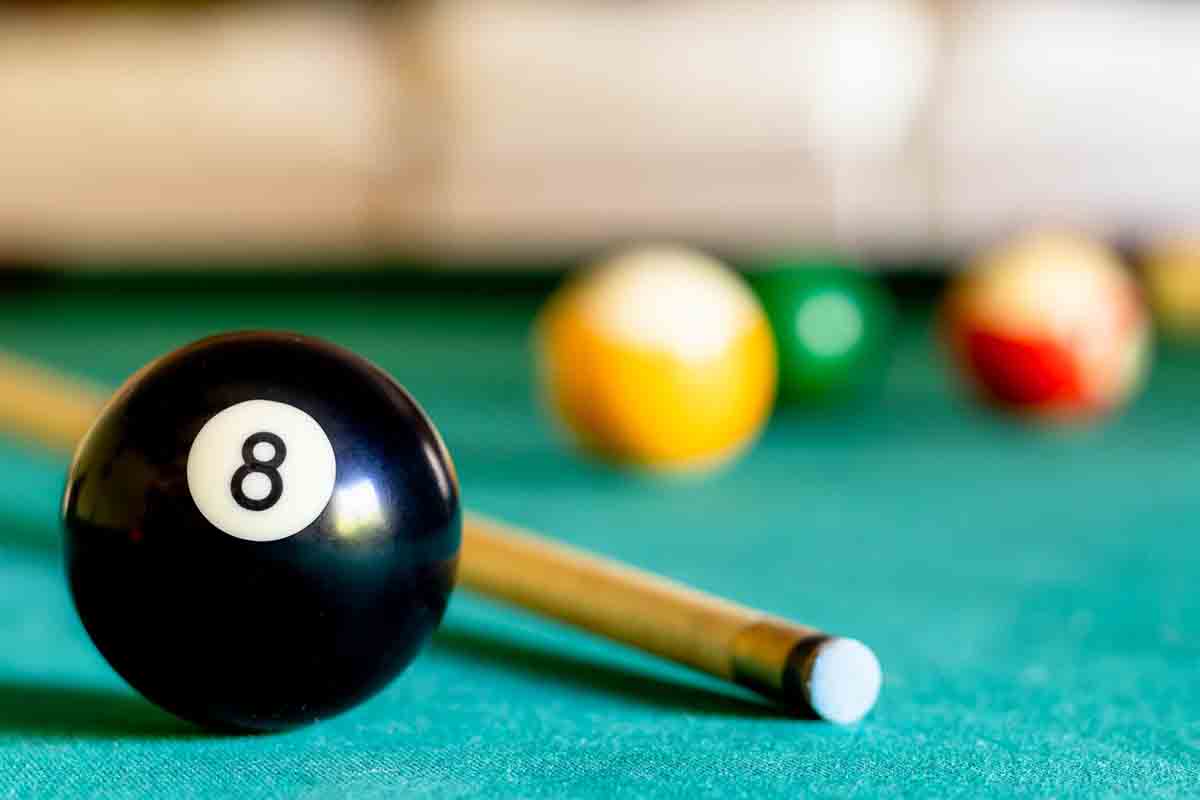How to Play 8-Ball Pool

In the game of pool, Eight Ball is a call shot game played with a cue ball and fifteen object balls, numbered 1 through 15.
If you haven’t played 8-Ball pool before, or perhaps need a refresher course, we have everything you need to know when it comes to 8-Ball rules and gameplay. Trust us, playing isn’t difficult once you get the hang of it!
Object of an 8-Ball Pool Game
The goal of the game is to get all of the object balls, 1-7, or 9-15, into the pockets. There are solid balls or striped balls. The object of the game is to be the first person to do this and then get the 8-Ball in a pocket. After the game break, you’ll determine who plays which, solids or stripes, at the beginning of the game.
What Do You Need to Play 8-Ball Pool?
To play 8-Ball pool, you need the following pieces of equipment:
Pool Table:
A pool table is usually 9 feet by 4.5 feet, but the game can be played on different-sized tables.
Pool Balls:
There are 16 balls in total, one white cue ball, seven striped balls, seven solid balls, and one black 8 ball.
Cue Stick:
Cues can be made from wood, carbon fiber, or fiberglass. They are used for striking the cue ball.
Pool Chalk:
Each player will chalk the end of their cue to ensure that there is good contact between the cue and the ball.
How to Play 8-Ball Pool: Rules of the Game
Here’s how to set up an 8-Ball pool table, how to create pool teams, game rules, and the best tips and strategies for winning 8-Ball pool!
Racking the Pool Balls in 8-Ball

To start your game, you have to rack the pool balls. The balls are racked in a triangle at the foot of the table with the 8-Ball in the center of the triangle.
The first ball of the rack is placed on the foot spot, a stripe ball in one corner of the rack, and a solid ball in the other corner. The order of the balls should be random, as long as the 8-Ball is in the center. The white ball should be placed anywhere behind the service line on the table.
Turns When Playing 8-Ball Pool
A coin should be tossed to decide who gets to choose whether they want to break. Once this is set, the player must hit the balls to ensure that four balls cushion and the cue ball doesn’t go into a pocket. If the 8-Ball is potted on the break, the player can then ask for a re-rack.
The first player to pot an object ball will need to continue to pot the balls from their category, either stripes or solids. The opposing player will have to pot the other group.
A player will continue to make shots until they either foul or fail to pot an object ball. When this happens, the opposing player will have a turn. The game continues like this until all the object balls have been potted. Then it’s time to sink the 8-Ball.
When it’s their turn, the player must say which pocket they plan to get the ball in. If they don’t get it in, the opposing player goes back to the table. If the player pots the 8 ball in any other pocket other than the one they said, they forfeit the game.
Fouls in 8-Ball
If a player commits a foul, the opposing player can place the cue ball anywhere on the table. Fouls can include:
- Hitting the cue ball off the table or twice
- Failing to hit your own object balls
- Potting one of the other player’s object balls
- Pushing the cue rather than striking it
- A player taking a shot when it’s not their turn
Calling the Shots
If you're making a “bank shot” or “combination shot”—two types of call shots—you should inform your opponents of your intended shot because those shots are not considered obvious. Name the ball and pocket for which you intend to aim. You don't have to give any more detail than the object ball and the intended pocket.
Eight Ball is generally played as a call shot game, which means that before you hit a ball, you must call the shot. First, you pick your shot, then you say it aloud so your opponent can hear you: “Five ball in the corner pocket” or whatever the shot is that you're about to make.
If the shot is obvious, you don't have to call it, but your opponent is entitled to ask if he or she is not sure. If you pot a ball that you did not call (called “slopping”), official rules say to leave the ball in the pocket. However, many people prefer to return the slopped ball to the foot spot. One way or another, your turn is forfeited to the next player.
Making Contact
On all shots—after the break and not when the table is open—the player must hit one of his group of balls first, and either pocket a ball, or make a ball (or the cue ball) contact the side of the table.
You can make the cue ball bounce off the side of the table (bank shot) before striking the object ball, but the object ball must be pocketed, or it, or the cue ball, must contact the side of the table.
If either of the balls does not contact the side of the table, the shot is considered a foul. Your opponent may then play the cue ball in hand from anywhere on the table (this does not necessarily have to be from behind the head string—that just applies to the opening break).
Shots in 8-Ball Pool

In pool, not all shots are created equal. Here’s a look at some common shots in 8-Ball pool:
Fouls and Ball-Jumping
A shot is considered to be a foul if it is jumped off the table. Jumping a ball off the table means you lose your turn to your opponent.
Your opponent may spot the balls in numerical order from any location on the table (that means he or she can place the ball anywhere on the table before taking his or her next turn).
If you jump the 8-Ball off the table, you lose altogether! So, keep your eye on that ball and be careful! If you jump a ball—other than the 8-Ball —off the table, you lose your turn.
Combination Shots
Combination shots are legal shots, but you can never use the 8-Ball as the first contacted ball. In other words, you can use the 8-Ball in combination with another object ball to pocket an object ball, as long as you don't strike the 8-Ball first.
Illegal Pocketing
A ball is considered illegally pocketed for the following reasons:
- If you pocket a ball while lobbing another ball off the table (shooting a foul)
- The object ball that you called does not go into the designated pocket.
Losing the Game 8-Ball
You can forfeit and lose the game for the following reasons:
- Pocketing the 8-Ball (except on the opening break) before your object balls have been pocketed
- Pocketing the 8-Ball on the same shot as pocketing your remaining object balls
- Jumping the 8-Ball off the table
- Pocketing the 8-Ball at the end of the game in a different pocket than the one you call
- Pocketing the 8-Ball when it's not the legal object ball
Basically, you need to keep an eye on that 8-Ball to make sure it is not going where it shouldn’t. This will keep you in the game and give you the best shot at winning.
8-Ball Pool Rules to Remember
To excel in the game of 8-Ball pool, you need to know the rules. Here are some general rules:
- The opening break is never a called shot.
- If you are making the break, you may make another shot as long as at least one ball on the break was legally pocketed.
- If you fail to make a legal break (no ball is pocketed), then your opponent may decide to shoot the balls as they rest on the table after the break, or the opponent may choose to rebreak.
- If you pot the 8-Ball on a break shot, all the balls stay potted except the 8-Ball, which is returned to the table. The opponent can rebreak if the 8-Ball is pocketed or can spot the 8-Ball on the table on the foot spot.
- If you shoot a ball off the table during an opening break, you forfeit your turn. Your opponent then takes position at the table and may continue shooting or take the cue ball in hand and play from behind the head string.
- The table is considered “open” after a legal break shot, meaning that stripes or solids have not yet been determined. The table is always considered open immediately following the break shot. You may strike any object ball at this point, whether it is striped or solid. It is even legal to strike the 8-Ball when the table is open—but don't pocket the 8-Ball.
You can only hit the 8-Ball as part of a combination shot at this point during the game. If you make a direct strike on the 8-Ball, you lose your turn. In this case, any pocketed balls remain pocketed. Your opponent can continue to play on the open table at this point.
8-Ball Pool Tips and Strategies
Here are some tips to help you get the most out of your 8-Ball pool game:
1. Keep it on the table after the break.
If you scratch on the break or send the cue ball flying, your opponent will come to the table with the cue ball in the kitchen and choose which suit to play. You want your opponent to earn everything by hitting the break with control.
2. Move balls to key positions for breakouts.
Always be mindful of where your object balls end up. Play safe while positioning one of your balls near a cluster. This gives you a future offensive opportunity to play a break-out.
3. Don't start running out until you have a plan
Before running out, wait until all of your balls have a viable pocket or an easy break-out. If you find yourself in a bad spot while there are still four or five balls on the table, rethink the situation and decide whether there’s a good defensive option.
Where to Play 8-Ball Pool Online
If you’re looking to play 8-Ball pool online, here are some sites to check out:
These are all cool online games to try to work on your game so that when you’re ready to play in person, you can be a fierce competitor! Look for a multiplayer game to test your skill!
Looking for more fun games to play with the family? Grab a deck of cards and check out our Card Games section!

